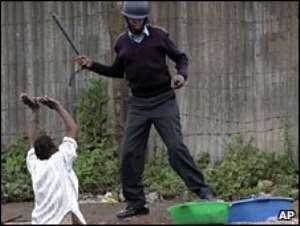
Kenya's state-sponsored rights body has released a video clip in which an officer says the police chief ordered the killing of suspects.
Police constable Bernard Kiriinya has died under mysterious circumstances since giving his testimony to the Kenya National Human Rights Commission.
But police have dismissed the allegations, saying they are intended to tarnish the image of the force.
The UN special envoy on extra-judiciary killings is to release his report.
Philip Alston, who has been on a 10-day visit, is probing the violent aftermath of the 2007 elections and claims of arbitrary killings during security operations against rebel militias in Mt Elgon in western Kenya, and the Mungiki sect in the capital, Nairobi.
He will present his report to a session of the UN Human Rights Council.
In the video, Mr Kiriinya claimed that the executions were ordered by police commissioner Major General Hussein Ali.
He is seen on the clip recounting how security officers brutally killed a suspect and were rewarded with $65 (£45).
"They brought him down to the ground and started hacking him with machetes and hitting him with clubs. They disfigured his face so that nobody would recognise his body," Mr Kiriinya says.
"The [police] commissioner was pleased with the work done and instructed us to remain quiet. They brought us 5,000 shillings ($65) each as a token."
He was shot dead last October.
The KNHCR claims that more than 500 people had been killed by the police and says Major Ali should resign for failing to stop the killings.
Police spokesman Eric Kiraithe questioned why the rights body had waited so long to release the information.
"To choose until he [Alston] is ready to release his findings - any person of sound mind would infer that it is intended to influence the findings of the special rapporteur," Mr Kiraithe said.
Impunity
The BBC's Anne Waithera in Nairobi says Mr Alston has heard horrifying accounts of how Kenyan police officers were involved in extra-judicial killings.
Witnesses recounted how young men and defenceless women were executed for being in the wrong place at the wrong time, our correspondent says.
Mr Alston has urged President Mwai Kibaki and Prime Minister Raila Odinga to ensure that those implicated by his investigations are punished.
The failure to establish a local tribunal to charge the perpetrators of the post-election violence which killed 1,500 people has led to uncertainty over the government's commitment to ending impunity.
Kofi Annan, the chief mediator, expressed disappointment and said he would hand a list of the suspected ringleaders of the violence to the International Criminal Court if a local court was not set up soon.
Violence broke out between supporters of President Kibaki and Mr Odinga, after claims that the presidential results were rigged.
The rivals agreed to share power to bring an end to the violence in February 2008, following weeks of talks led by Mr Annan.




 Lay KPMG audit report on SML-GRA contract before Parliament – Isaac Adongo tells...
Lay KPMG audit report on SML-GRA contract before Parliament – Isaac Adongo tells...
 Supervisor remanded for stabbing businessman with broken bottle and screwdriver
Supervisor remanded for stabbing businessman with broken bottle and screwdriver
 NDC watching EC and NPP closely on Returning Officer recruitment — Omane Boamah
NDC watching EC and NPP closely on Returning Officer recruitment — Omane Boamah
 Your decision to contest for president again is pathetic – Annoh-Dompreh blasts ...
Your decision to contest for president again is pathetic – Annoh-Dompreh blasts ...
 Election 2024: Security agencies ready to keep peace and secure the country — IG...
Election 2024: Security agencies ready to keep peace and secure the country — IG...
 People no longer place value in public basic schools; new uniforms, painting wil...
People no longer place value in public basic schools; new uniforms, painting wil...
 'Comedian' Paul Adom Otchere needs help – Sulemana Braimah
'Comedian' Paul Adom Otchere needs help – Sulemana Braimah
 Ejisu by-election: Only 33% of voters can be swayed by inducement — Global InfoA...
Ejisu by-election: Only 33% of voters can be swayed by inducement — Global InfoA...
 Minority will expose the beneficial owners of SML, recover funds paid to company...
Minority will expose the beneficial owners of SML, recover funds paid to company...
 Prof. Opoku-Agyemang has ‘decapitated’ the NPP’s strategies; don’t take them ser...
Prof. Opoku-Agyemang has ‘decapitated’ the NPP’s strategies; don’t take them ser...
